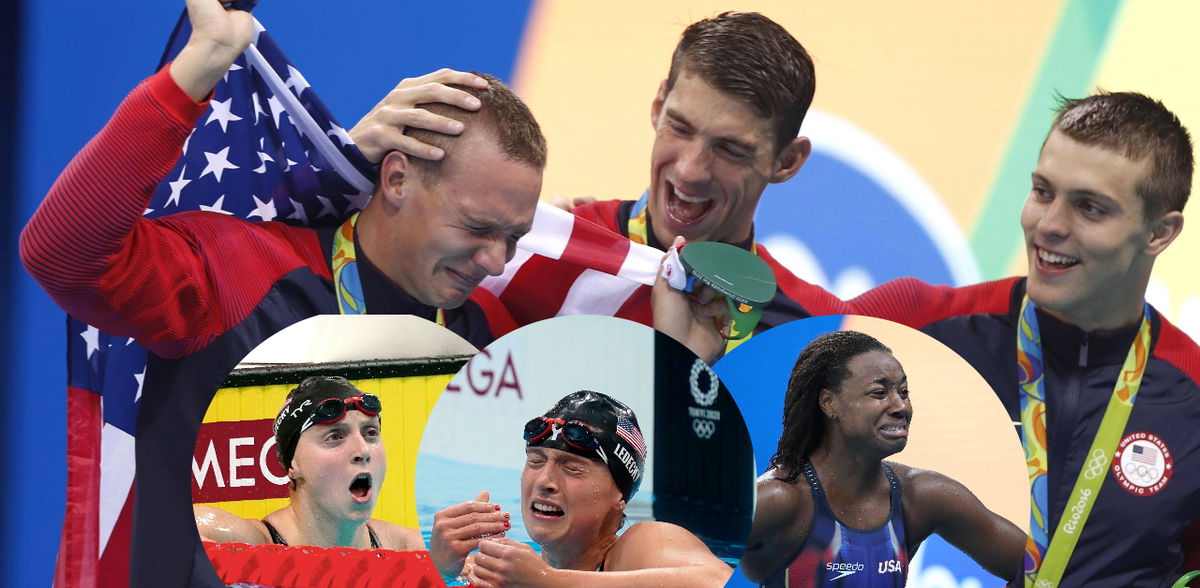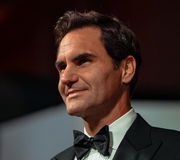
Imago
Image Credits: IMAGO

Imago
Image Credits: IMAGO
The United States has been a breeding ground for legendary swimmers, with icons like Michael Phelps, Katie Ledecky, Caeleb Dressel, and Simone Manuel leading the way in the sport’s history. Phelps is a name synonymous with swimming. The Baltimore Bullet has achieved everything that was there for a swimmer to achieve. Having secured 28 Olympic medals and a multitude of world championship titles, the swimming GOAT has conquered every aspect of the sport.
Watch What’s Trending Now!
Caeleb Dressel also crafted his own legacy with an impressive seven Olympic gold medals. Since creating a worldwide buzz during his high school days, the Florida native has seen it all. He is widely recognized as one of the world’s premier swimming athletes. On the other hand, Katie Ledecky and Simone Manuel have blazed a trail in the women’s category, emerging as two of the most prominent figures in women’s swimming.
Despite all these accolades, accomplishments, and excitement, the one thing that these swimming prodigies often talk about is mental and cognitive health. To be more specific, there have been several athletes who have grappled with mental health challenges throughout their careers. The GOAT of swimming, Michael Phelps, was also not untouched by mental health issues, and at the pinnacle of his career, the 23-time gold medalist battled depression and anxiety during his remarkable eight medals winning spree (6 gold, 2 bronze) in the 2004 Olympics. Phelps eventually acknowledged his mental health challenges and addressed them openly.
ADVERTISEMENT
Notably, Caeleb Dressel also withdrew from the 2022 World Swimming Championships, citing undisclosed health issues. Apart from Dressel and Phelps, there have been many athletes who have encountered the same challenges during their careers and have bravely shared their experiences.
Michael Phelps, Caeleb Dressel, and Simone Manuel pulled off the curtains from their mental health challenges
Michael Phelps, despite achieving a pinnacle in swimming, was not immune to cognitive health struggles. The legend who grew up with Attention Deficit Hyperactivity Disorder (ADHD), later found his solace in his beloved turquoise arena, never shies away from sharing various avenues of his uphill battle with mental health challenges.
ADVERTISEMENT
He shared his experiences with Bloomberg Television on their YouTube channel in 2022, demonstrating courage by discussing his mental health journey and the challenges he faced in recent years. He mentioned the incident when he did a cover story with Sports Illustrated by Tim Layden. Phelps stated, “I dropped my shoulders, and I just let it all out. I think for me, when I checked myself in to get treatment and to get help, I knew that; that’s what I needed, and I was at the end of the road and I had to get help.”
He also revealed that when he asked for help for the first time, everything became easier. Talking about the question that Layden asked, Phelps covered all the nooks and crannies, and he felt comfortable sharing everything. He also reiterated the fact that communication is the key and that no one in the world is perfect.
ADVERTISEMENT
ADVERTISEMENT
Caeleb Dressel, the 7x Olympic gold medalist, also had his fair share of mental health struggles. During an interview with Graham Bensinger, Dressel addressed how he started to have panic attacks when he became the high school sensation and was the number one recruit. Talking about it, he said, “It was really difficult to swim in high school with all this new attention and spotlight, and try to swim when you are having panic attacks.” In the same interview, his mother also talked about Dressel. She added that the pressure that society put on him and that he put on himself affected his health.
Top Stories
Greg Biffle’s $4M Worth Prized Possession Still Without a Buyer Leaves NASCAR Fans Heartbroken

LIV Golf Braces for Another Possible Exit in Wake of Brooks Koepka Departure

Sean Payton Announces Retirement Plans as Broncos HC Demands Improvement From Bo Nix & Co. Before Playoffs

Biff Poggi All But Confirms Bryce Underwood’s Michigan Future After Announcing His Own Departure

Roger Federer Draws Criticism from Swiss Government Chief for Tourism Boom in Country

Amanda Balionis Confirms New Relationship Ending Months of Rumors

During this period, the seven-time Olympic gold medalist took a six-month hiatus from the sport. He mentioned that he felt the need for this break and was uncertain about whether he wanted to continue swimming. During this time, he often stayed in bed and didn’t engage in any activities. He also added the year 2004, when he faced the challenges for the first time.

Imago
DRESSEL Caeleb USA 100m Freestyle Men Heats Swimming FINA 19th World Championships Budapest 2022 Budapest, Duna Arena 21/06/22 Photo Giorgio Scala / Deepbluemedia / Insidefoto GiorgioXScala
Simone Manuel is another name that has been a consistent performer for the United States. The five-time Olympic medalist also faced challenges like “overtraining syndrome” that led her to take her name out of world championship trials in June. However, the Texas native has never shied away from sharing what she was going through. In an interview published by Swim Swam on their YouTube channel, the two-time Olympic gold medalist talked extensively about her condition and said, “I continue to stay strong during this process, even though there were times when I wanted to give up.” Apart from these three, there are many other athletes who have addressed their struggles openly.
ADVERTISEMENT
Regan Smith and Dara Torres’ perspective on mental health
Regan Smith, who was a part of the 2023 U.S. world championship squad and secured two silver and one bronze medal at the 2021 Tokyo Olympics, once shared her struggles in an interview published by Swim Swam on their YouTube channel. She stated, “Mental health in sports has always been stigmatized, and when I struggled with it a few years back, starting right when COVID started, I really struggled with it a lot.”
ADVERTISEMENT
Sharing her coping mechanism, she then added, “The second that you vocalize what you’re going through, I think it makes it a lot easier, because you realize that you’re not alone; you realize that it’s so normal to experience these feelings, and then it makes it a lot easier to overcome them.” Smith further expressed her gratitude that she was able to express her true feelings and also added that the performance pressure is an inevitable challenge, but she has developed strategies to cope with it.

Imago
Regan Smith of United States of America competes in the 200m Butterfly Women Heats during the 20th World Aquatics Championships at the Marine Messe Hall A in Fukuoka Japan, July 26th, 2023. GiorgioXScala
Four-time Olympic gold medalist Dara Torres is another name for someone who has carved her own path in swimming and is most widely regarded as one of the best swimmers in the world. She has also been through the same road and did not shy away from expressing her thoughts.
ADVERTISEMENT
In an interview with USA Today, Torres stated, “Back in my day, in the ‘80s and ‘90s, you didn’t really speak about mental health issues; it was kind of a taboo thing, or if you were dealing with depression or something like that, we didn’t really recognize it because it wasn’t talked about.” She also appreciated the fact that the athletes are now more vocal about it and added that the expression of feelings and experiences is a crucial part of healing and coping with challenges.
These athletes are beacons of inspiration and resilience, lighting the way for others in their struggles with mental health. Their openness breaks down barriers, emphasizing the importance of addressing these challenges.
ADVERTISEMENT
Watch This Story: Tiger Woods’ ‘Massive Scream for Help’ Resonated With Michael Phelps, Who Comforted the Golfer During a Dark Moment in 2017.
“This article is not intended to replace, and is not an alternative to any medical advice. Readers must therefore obtain the relevant professional or specialist advice.”
ADVERTISEMENT
ADVERTISEMENT
ADVERTISEMENT

